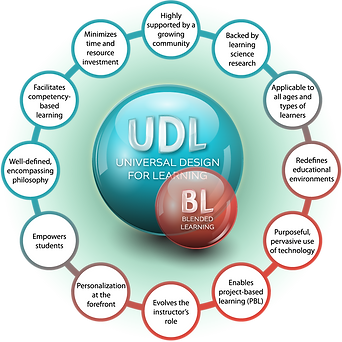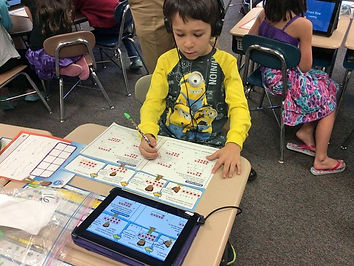

UDL INFUSED BLENDED
Learning Unit
An integration of both physical and online spaces to create an interactive and engaging learning experience.
Grade Level: Grade 1
MODULE: Big Ideas:
-
Different ways of representing numbers, relationships among numbers, and number systems.
-
Understand the meanings of operations and how they relate to one another (understand the connections between counting and the operations of addition – ways to represent addition).
-
Compute fluently and make reasonable estimates. (NCTM 2000, p. 78).
DURATION: 1 WEEK (DAY BY DAY LAYOUT)

RESOURCE-RICH, FLEXIBLE STUDENT- CENTERED LEARNING ENVIRONMENT
Station-Rotation / Individual-Rotation Model
CHOICE BOARDS

Choice Boards enable students to have the option to choose what is most relevant and meaningful to them both in terms of the type and the medium through which they consume content. Students learn to take charge of their learning, overcome learning barriers, and become successful learners.
Research-based Instructional Strategies and Evidence-based practices:
-
Scaffolding
-
Active Engagement
-
Modeling
-
Differentiated Instruction and Learning (in both class-wide and small homogenized groups)
-
Explicit Direct Instruction
-
Ongoing Assessment and Feedback
-
Multimodal Instruction
-
Collaborative / Partner Learning

Purposeful use of technology in personalizing learning
with a UDL Mindset.


TEN FRAME CHOICE BOARD
(Click on the pictures for Links to Activities)
OBJECTIVES:
-
Students will be able to represent and add numbers (0-20) using concrete materials such as ten-frames.
-
Students will be able to apply their understanding to real-world problems.
LESSON TITLE: Adding Numbers (1-20) Using Tens Frame
LESSON TITLE: Representing numbers using tens and ones using counters and Base 10 blocks in multiple ways.
OBJECTIVES:
Students will be able to work with numbers (10-19) to understand their place value and will be able to represent a given 2-digit numeral in at least two ways. They will be able to compose & decompose numbers from 11 to 19.

MATERIALS:
PLACE VALUE CHOICE BOARDS
MATERIALS:
LESSON TITLE: Number bonds facilitate students' understanding of part-part-whole relationships, which is the most critical of all early numeracy skills.
OBJECTIVES:
Students will be able to
-
Explain in their own words (using appropriate math vocabulary) how numbers join together (composition) and how they break apart (decomposition) into parts.
-
use models and objects to represent number bonds to 10 (concrete representation using ten frames, multilink or unifix cubes),
-
express number bonds to 10 as equations (abstract representation)
-
identify missing numbers to complete number bonds to 10.
MATERIALS:
NUMBER BONDS CHOICE BOARD

LESSON TITLE: Doubles addition facilitates students' understanding of the concept that a number sentence with two of the same addends is the concept of adding doubles and is a doubles fact.
OBJECTIVES:
Students will be able to
-
understand that the addends are the same in a doubles fact.
-
Fluently add doubles facts up to 10 and add doubles facts up to 20 with 80% accuracy.
-
Learn to use double facts and combinations of 10 to help solve addition within 20.
-
use doubles to add a doubles fact within 20 to find the missing part or sum.
MATERIALS:

DOUBLES CHOICEBOARD
LESSON TITLE: Students will be able to use their own strategies to solve basic addition problems with numbers (1-20) and explain, in their own words, how they got the answers.
MATERIALS:
CHOICE BOARDS WITH LINKS TO ADDITIONAL VIDEOS, LESSONS, GAMES, PRINTABLE & LIVE WORKSHEETS, AND GAMES ARE AVAILABLE ONLINE FOR EXTRA PRACTICE AT HOME (IN A VIRTUAL SETTING)
PRACTICAL, AUTHENTIC, AND FUN APPLICATION OF CONCEPTS LEARNT THAT INVOLVES COLLABORATIVE LEARNING WITH PARTNERS, MOVEMENT, ACTIVE DISCUSSIONS, PRACTICING ESSENTIAL MATH VOCABULARY WITH ABSTRACT AND CONCRETE MATERIALS TO CATER TO LEARNER VARIABILITY
THIS SCAVENGER HUNT CAN BE PLAYED VIRTUALLY TOO WITH PARTNERS ONLINE AS ALL THE MATERIALS ARE AVAILABLE TO PRINT AND DETAILED INSTRUCTIONS ARE AVAILABLE




